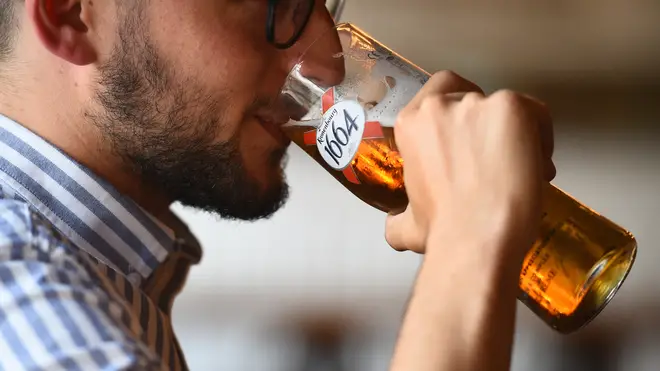
Lewis Goodall 10am - 12pm
30 March 2023, 19:04

A team from Cambridge University carried out the study looking at how people choose what to drink.
Online shoppers buy fewer alcoholic drinks when presented with an increased selection of non-alcoholic options, research suggests.
A team from Cambridge University presented study participants with varying proportions of alcoholic and non-alcoholic drinks and asked them to select drinks to purchase for their next online shop.
They recruited 737 adults living in England and Wales, all of whom regularly purchased alcohol online.
Of these, 607 completed the study and were included in the final analysis – 60% were female and the average (mean) age was 38.
Participants selected drinks from 64 options in a simulated online supermarket designed to look and function like a real online store.
Options included a range of beers, ciders, alcohol-free beer and cider alternatives, and soft drinks.
Participants were randomly assigned to one of three groups, each of which was presented with a different proportion of alcoholic and non-alcoholic drinks.
Non-alcoholic drinks formed 25% of the options presented to group one, rising to 50% for group two and 75% for group three.
The group exposed to the lowest proportion of non-alcoholic drinks, group one, selected 29.4 units of alcohol.
This compared with 17.5 units selected by those exposed to the highest proportion of non-alcoholic drinks, group three, equivalent to a reduction of about 41%.
Participants were then asked to actually purchase the same drinks online from Tesco, the largest national supermarket in the UK.
Around two-thirds of participants completed this second stage, with 422 going on to purchase drinks.
The researchers point out that “cart abandonment” – where people do not purchase items they put in their shopping cart – is common in online shopping contexts.
The researchers found that among participants exposed to the highest proportion of non-alcoholic drinks, 52% of the drinks purchased were alcoholic, compared to 70% of drinks that were purchased by those exposed to the lowest proportion of non-alcoholic drinks.
Lead author Dr Natasha Clarke said: “We created our simulated supermarket to be as close as possible to an actual online supermarket and found that increasing the proportion of non-alcoholic drinks that shoppers were exposed to made a meaningful difference to their alcohol selection.
“Though we’d need to confirm these findings using only a real online supermarket, they are very promising.”
Senior author Dr Gareth Hollands said: “Supermarkets typically stock a wider range of alcoholic drinks than non-alcoholic alternatives aimed at adults, but this is slowly changing.
“Our results suggest that if non-alcoholic options were to become the majority instead, we might expect to see substantial reductions in alcohol purchasing.”
The overall number of drinks that participants selected and purchased remained similar between groups, according to the research, suggesting that the effects were a result of shifting people’s choices.
Professor Dame Theresa Marteau, director of the Behaviour and Health Research Unit and a bye-fellow at Christ’s College, said: “We all know that drinking too much alcohol is bad for us, but we’re often unaware of how much we are influenced by the environment around us.
“Making changes to this environment – from exposing people to a greater proportion of healthier options through to changing the sizes of the utensils we eat and drink from – can help us cut down on potentially unhealthy habits.
“Even relatively small changes can make a difference both to individuals and at a population level.”
The research is published in the journal PLOS Medicine.